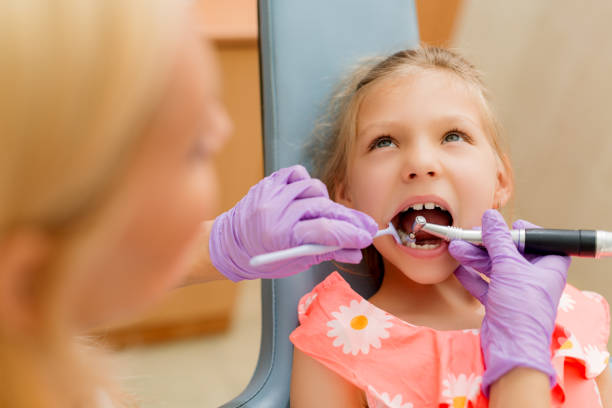our teeth cleaning services
A Sparkling Smile for Every Visit
At Pediatric Dentistry, our teeth cleaning services play a crucial role in keeping your child’s smile bright and healthy.
We understand that dental visits can sometimes be intimidating for kids, so our team is committed to making each cleaning session fun, comfortable, and stress-free.
By using gentle techniques and a kid-friendly approach, we ensure that your child leaves our office with a sparkling smile and a positive attitude toward dental care.
By providing regular checkups, fluoride treatments, dental sealants, and personalized care, we help ensure that your child’s teeth remain strong and healthy for years to come.
Prevention is the key to avoiding more serious, painful, and costly dental issues down the road, and our team is dedicated to making sure your child has the best chance for a healthy smile.


Why Preventative Care is Important
Preventative dental care is essential in maintaining not only your child’s oral health but their overall well-being.
When dental issues like cavities, tooth decay, or gum disease are left untreated, they can lead to pain, infections, and even affect your child’s ability to eat or speak properly.
By focusing on prevention, we can protect your child from these common dental problems and keep their smile healthy and bright. Our goal is to make dental visits a positive experience while reducing the need for more invasive treatments in the future.
What Happens During a Teeth Cleaning?
Our experienced dental hygienists use gentle, child-friendly tools to thoroughly clean your child’s teeth. We carefully remove plaque and tartar from the surfaces of the teeth and below the gumline, where bacteria can hide. The process is pain-free, and we take extra care to ensure that even children with sensitive teeth feel comfortable throughout the visit. After the cleaning, we’ll polish your child’s teeth, leaving them smooth and shiny, which also helps prevent future plaque buildup.
Removing Plaque and Tartar
Plaque is a sticky film of bacteria that forms on the teeth every day. If not removed by regular brushing and flossing, it can harden into tartar, a tougher substance that can only be removed by a dental professional. Tartar buildup increases the risk of cavities and gum disease, so it’s important to have it removed during regular cleanings. By keeping your child’s teeth free of plaque and tartar, we can prevent future oral health problems and keep their smile looking its best.
Preventing Gum Disease and Cavities
Gum disease, or gingivitis, is an inflammation of the gums caused by plaque buildup. It can lead to swollen, bleeding gums, and, if left untreated, it can progress to more serious issues that could impact your child’s overall health. Our teeth cleanings help prevent gum disease by keeping the gums healthy and free from harmful bacteria. Regular cleanings also reduce the risk of cavities by removing plaque and tartar before they can cause tooth decay.
Gentle Care for Sensitive Teeth
We understand that some children may experience sensitivity during cleanings, especially if they have tender gums or developing teeth. That’s why we take a gentle approach, ensuring that the cleaning process is as comfortable as possible. Our friendly team explains each step of the process in kid-friendly terms, helping your child feel at ease. We also offer tips on how to care for sensitive teeth at home, making sure your child’s dental care routine is both effective and gentle.
Building Positive Dental Experiences
At Pediatric Dentistry, we know that creating a positive experience early on helps children develop a lifelong love for dental care. We go out of our way to make teeth cleaning visits fun and engaging. From our welcoming office environment to our friendly staff, we aim to ensure your child feels comfortable and excited about coming to the dentist. When kids enjoy their dental visits, they’re more likely to continue good oral hygiene habits throughout their lives.
Ongoing Dental Education
During each cleaning visit, we take the time to educate both parents and children about proper brushing and flossing techniques. Our team demonstrates effective ways to care for your child’s teeth at home, offering personalized tips and recommendations to suit their specific needs. We want to empower children to take charge of their dental health, making teeth cleaning a regular part of their routine.
Teeth Cleanings at Pediatric Dentistry Include:
- Plaque and tartar removal to keep teeth clean and cavity-free
- Prevention of gum disease and cavities for long-term oral health
- Gentle cleaning for sensitive teeth to ensure comfort during each visit
- Education and fun to promote a positive attitude toward dental care
Your Questions Answered
Your child deserves honest dental care tailored to their needs. We’ll listen to your concerns and recommend proven treatments.
The American Academy of Pediatric Dentistry recommends bringing your child in to see us by their first birthday. Though this may sound early, we can teach you proper pediatric oral hygiene techniques, check for cavities, and watch for developmental problems.
Various forms of tooth decay can affect babies and small children. Early childhood cavities (tooth decay) can develop rapidly, progressing from the hard outer enamel layer of a tooth into the softer inner dentin in six months or less. Most of all, we want to ensure your child has a positive experience at our office and will be a regular visitor for years to come.
The specialized field of pediatric dentistry exists because a child’s mouth differs largely from an adult’s mouth. As pediatric dentists, we have an over 35 years of experience. Our specialized field covers the oral health of children, and our education and experience prepare us for the unique needs of children, infants, and adolescents. We also tend to those who have special healthcare needs.
The American Association of Orthodontics recommends children receive an orthodontics screening by the age of seven. It is important for us to evaluate the development of your child’s incoming adult teeth. If your child is not in need of more aggressive orthodontic treatment, we will address dental issues once more of their permanent teeth are in place, and their jaw is developed.
A lifetime of good oral health begins during infancy, even before the baby’s first tooth emerges. We have provided some guidelines below to help new parents!
Generally, the first baby teeth that appear are usually the lower front teeth and can appear between six and nine months of age. All babies are unique, so it’s not unusual if your child’s teeth emerge before or after this age. When their first teeth emerge, it’s time to transition to a baby toothbrush.
As more teeth appear, the American Academy of Pediatrics (AAP) recommends that you start brushing your child’s teeth with a small amount of fluoride toothpaste the size of a grain of rice. Gently brush the inside and outside of your baby’s teeth, as well as their tongue. Since a tiny amount of toothpaste is being used, there is no need to rinse.
A lifetime of good oral health begins during infancy, even before the baby’s first tooth emerges. We have provided some guidelines below to help new parents!
It’s a good idea to get into the habit of wiping your baby’s gums with gauze or a soft, wet washcloth to remove any sugars, milk, or residual food. Simply wrap the gauze or cloth around your index finger and gently rub it over their gums. There is no need to use any toothpaste yet.
One serious form of dental decay among young children is baby bottle tooth decay. This condition is caused by frequent and long exposures of an infant’s teeth to liquids that contain sugar. Among these liquids are milk (including breast milk), formula, fruit juice, and other sweetened drinks.
Putting a baby to bed for a nap or at night with a bottle other than water can cause serious and rapid tooth decay. Sweet liquid pools around the child’s teeth, allowing plaque bacteria to produce acids that attack tooth enamel. If you must give the baby a bottle as a comforter at bedtime, it should contain only water. If your child doesn’t fall asleep without the bottle and their usual beverage, gradually dilute the bottle’s contents with water over two to three weeks.
After your child’s teeth erupt, you can use a smear size amount of baby toothpaste and a soft baby toothbrush. When children reach three years of age, we advise parents to supervise their child’s teeth brushing and make sure they only use a pea-sized amount of toothpaste. Your child mustn’t swallow the toothpaste.
Poor oral health or a diet high in sugary foods can lead to cavities in your child’s mouth. When children don’t brush or floss well or often enough, the bacteria in their mouths feed on the sugars that are left behind on their teeth. This develops into plaque and eventually tartar, leading to tooth decay.
If plaque and tartar are not removed, it can cause decay, cavities, periodontal disease, and other oral health problems. Your child may experience discomfort when eating and drinking hot or cold foods as a result of tooth decay. It’s important to see your pediatric dentist at one of our Texas offices as soon as possible if your child is experiencing any pain so that we can ensure no decay could spread.
Here are a few ways to prevent tooth decay for your child:
- Brush and floss daily
- Use fluoridated toothpaste
- Use an antibacterial mouthwash
- Take your child for regular dental checkups and cleanings; preventative care is essential for healthy gums and teeth
- Ask our Texas pediatric dentist about dental sealants which can prevent cavities and benefit tooth strengthening
- Chew sugar-free gum
- Limit your child’s intake of sugary foods and drinks
Book A Visit
Contact Us
We’re always welcoming new patients. We can’t wait to meet you!
